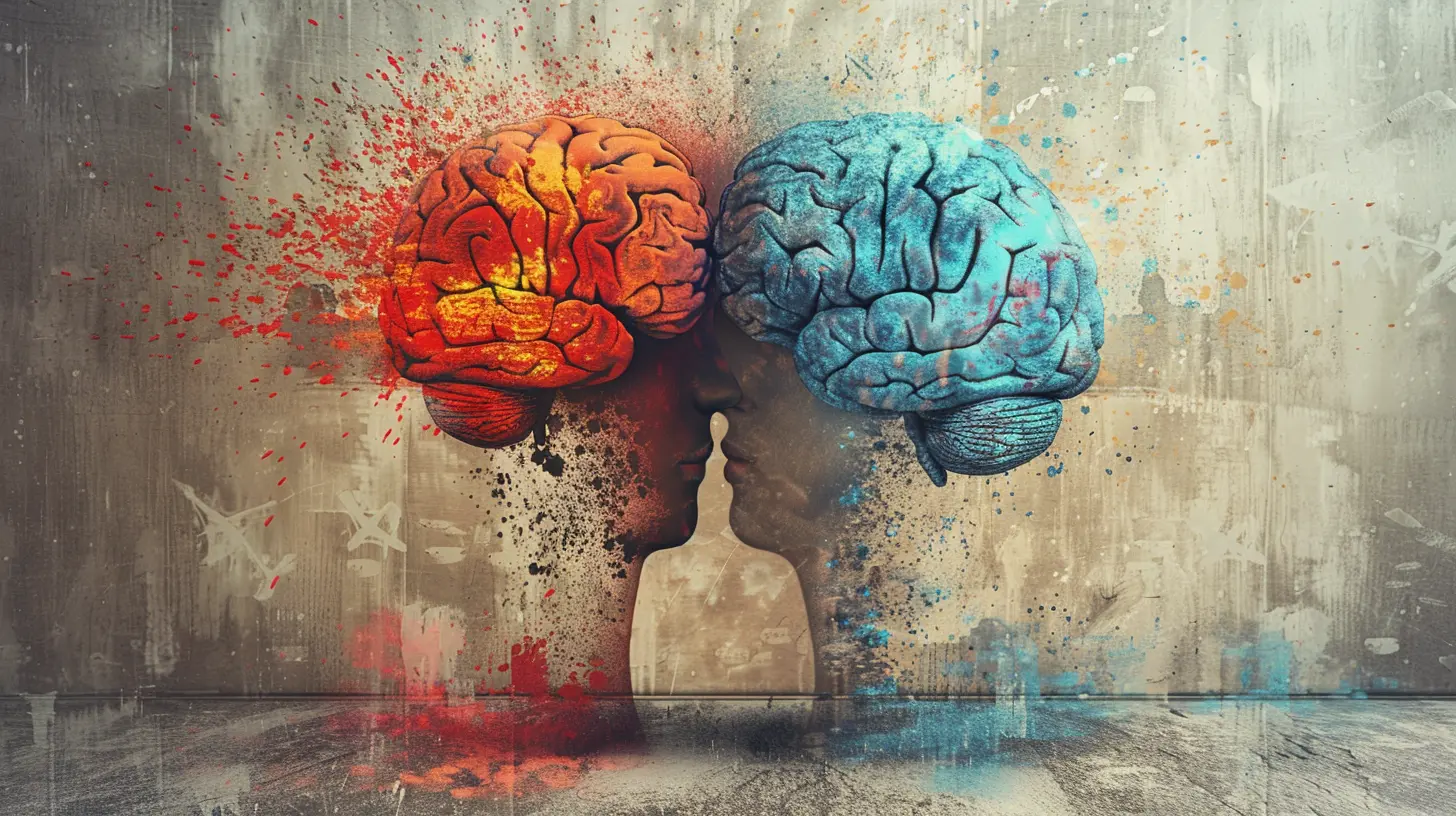Cognitive Dissonance: The Mental Struggle Between Beliefs and Actions
22 April 2025
Have you ever found yourself feeling torn between what you believe and what you're doing? Maybe you told yourself you'd start eating healthier, yet you found yourself reaching for that extra slice of pizza. Or perhaps you believe in being environmentally conscious but still drive a gas-guzzling car every day. If any of these scenarios sound familiar, you've likely experienced something known as cognitive dissonance.
Cognitive dissonance is that uncomfortable tension we feel when our actions don't align with our beliefs or values. It’s that nagging feeling that something just isn’t right. But why does this happen? And more importantly, how do we deal with it?
In this article, we’ll dive deep into what cognitive dissonance is, why it happens, and how we can resolve it.

What is Cognitive Dissonance?
At its core, cognitive dissonance is a psychological concept that refers to the mental discomfort or stress we feel when we hold two or more contradictory beliefs, values, or attitudes, especially when our behavior conflicts with these beliefs. The term was first introduced by psychologist Leon Festinger in 1957, and since then, it's become a fundamental concept in psychology.Imagine your mind like a puzzle. Everything fits together neatly when your actions and beliefs are in harmony. But when they clash—like two pieces of the puzzle forcing themselves into the same spot—your brain starts to feel that dissonance. It’s as if your mental puzzle has a missing piece, and your brain doesn’t like that one bit.
The Basics of Dissonance
To truly understand the concept, let's break it down:- Cognition: This refers to thoughts, beliefs, attitudes, or knowledge. It's the mental activity we engage in continuously throughout the day.
- Dissonance: This is the tension or disharmony that arises when two conflicting cognitions exist simultaneously.
When there's a mismatch between what we believe and what we do, we experience cognitive dissonance. It’s essentially your brain going, "Wait, something here doesn’t add up."
Why Does Cognitive Dissonance Occur?
Humans have a strong inner drive to maintain harmony in their beliefs, attitudes, and behaviors. We like to think of ourselves as consistent beings. When there’s a misalignment, our brain hits the panic button and signals discomfort. This discomfort can manifest in different ways—stress, guilt, anxiety, or even shame.For example, let’s say you believe smoking is bad for your health. However, you still smoke a cigarette from time to time. That inner contradiction—that you know smoking is harmful yet still engage in it—creates dissonance. Your brain wants to resolve this discomfort, so it starts coming up with ways to make sense of the situation.

How Cognitive Dissonance Affects Our Daily Lives
Cognitive dissonance isn’t some rare phenomenon. We all experience it in our daily lives, often without even realizing it. Let’s explore a few common scenarios:1. Healthy Habits vs. Unhealthy Choices
We all know that eating fast food regularly isn't great for our health. But how many of us still indulge in a greasy burger and fries after a long day? The dissonance here comes from the clash between our belief in staying healthy and our actual behavior of eating unhealthy food.2. Environmental Concerns vs. Convenience
Many of us care deeply about the environment and want to reduce our carbon footprint. Yet, we might still use plastic bags or drive to places when we could walk or bike. The convenience of these actions can conflict with our environmental values, leading to dissonance.3. Relationships and Cognitive Dissonance
Have you ever stayed in a relationship that didn’t make you happy, even though you believe you deserve better? The belief that “I deserve happiness” conflicts with the action of staying in an unfulfilling relationship, creating a sense of dissonance.4. Work Ethic vs. Procrastination
We often tell ourselves that we should be productive, work hard, and meet our goals. Yet, we might find ourselves binge-watching Netflix instead of working on that important project. The dissonance between our belief in a strong work ethic and our procrastination is a struggle many of us can relate to.
How We Cope with Cognitive Dissonance
When we experience cognitive dissonance, our brain seeks to resolve that uncomfortable feeling. We’ll do almost anything to reduce the tension, even if it means bending our beliefs or rationalizing our behaviors. But how do we do this?Here are some common strategies people use to reduce cognitive dissonance:
1. Change the Behavior
The most straightforward way to resolve dissonance is to align your actions with your beliefs. For example, if you believe in maintaining a healthy lifestyle, you might quit smoking or start exercising regularly to resolve the dissonance.2. Change the Belief
Sometimes, we can't change our actions, so we adjust our beliefs instead. For instance, someone who smokes might downplay the health risks by thinking, "Well, my grandparent smoked all their life and lived to 90, so it can't be that bad."3. Rationalization
This is perhaps the most common tactic. We justify our actions in order to reduce the discomfort. Using the smoking example again, someone might rationalize by saying, "I only smoke socially, so it’s not really that harmful."4. Selective Exposure
We tend to seek out information that aligns with our beliefs and avoid information that contradicts them. This helps us maintain consistency. For example, if you believe a certain diet is the best for health, you might only read articles that support that diet rather than those that criticize it.5. Trivialization
Sometimes, we try to convince ourselves that the issue isn’t that important. You might think, "Sure, I’m not eating as healthily as I should, but it’s not a big deal. Everyone has cheat days."
Why Cognitive Dissonance is Important to Understand
Cognitive dissonance isn't just a source of personal discomfort; it can have far-reaching consequences on our behavior, relationships, and even society. When we understand cognitive dissonance, we can become more aware of how it influences our decisions and actions.Here’s why it matters:
1. Improved Self-awareness
Recognizing when you’re experiencing dissonance can help you gain clarity about your true values. It forces you to examine whether your actions align with what you really believe.2. Encourages Positive Change
When we experience dissonance, it can motivate us to make changes—whether it’s adopting healthier habits, ending toxic relationships, or standing up for our beliefs.3. Helps Resolve Inner Conflict
Understanding cognitive dissonance can lead to better mental health. When we resolve the dissonance, we feel less stressed and more at peace with ourselves.4. Better Decision-Making
Being aware of dissonance helps us make more informed decisions. Instead of acting impulsively or avoiding uncomfortable truths, we can approach situations with a clearer, more rational mindset.Can Cognitive Dissonance Ever Be Positive?
Not all cognitive dissonance is bad. In fact, it can be a powerful motivator for personal growth. When we experience dissonance, it often tells us something important: We need to re-evaluate our actions or beliefs.For example, if you believe in fairness and equality but notice yourself making biased decisions, the dissonance can push you to become more self-aware and take corrective action. It’s like your brain giving you a nudge, saying, “Hey, something’s off here. Let’s fix it.”
In this way, cognitive dissonance can act as an internal compass, guiding us toward more authentic and aligned lives.
Final Thoughts
Cognitive dissonance is a fascinating psychological phenomenon that we all experience at some point. It’s that inner mental tug-of-war between our beliefs and actions. While it can be uncomfortable, understanding it can help us resolve inner conflicts, make better decisions, and ultimately live more harmoniously with ourselves.The next time you find yourself feeling uneasy about something, take a moment to reflect. Is there a gap between your beliefs and your actions? If so, how can you bridge that gap? The answers might just lead to a more peaceful mind.
all images in this post were generated using AI tools
Category:
Social PsychologyAuthor:

Gloria McVicar
Discussion
rate this article
3 comments
Rusty Thomas
This article effectively highlights the tension between beliefs and actions in cognitive dissonance. It's a crucial insight into understanding our decision-making processes and behaviors.
May 12, 2025 at 3:32 AM

Gloria McVicar
Thank you for your insightful comment! I'm glad you found the article highlights the important dynamics of cognitive dissonance in decision-making.
Shania McBride
Choose your beliefs wisely, or face chaos!
April 27, 2025 at 4:41 PM

Gloria McVicar
Thank you for your insight! Balancing beliefs and actions is crucial to maintaining mental harmony and avoiding chaos.
Eliza Wheeler
This article beautifully captures the essence of cognitive dissonance. It’s a reminder of how complex our minds are and the importance of aligning our beliefs with our actions. Thank you!
April 22, 2025 at 2:23 PM

Gloria McVicar
Thank you for your kind words! I'm glad the article resonated with you and highlighted the complexity of our minds.



